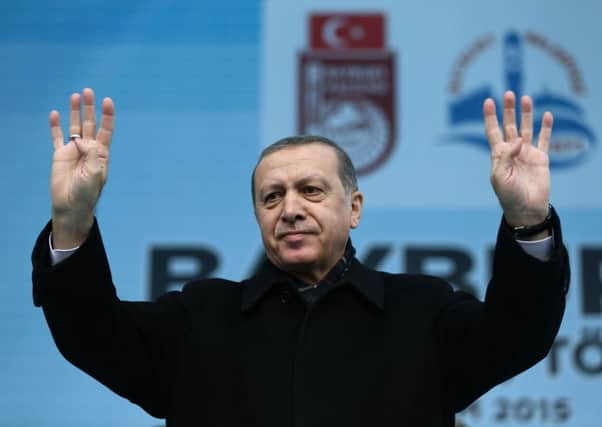Leaders: Russia and Turkey must end war of words


News earlier this week that Turkey had downed a Russian jet led to a collective intake of breath in Washington, Paris and London.
Just when it looked as if there was a genuinely international coalition of the willing for the fight against Islamic State, the Turks’ take-down of the SU-24 bomber threatened to undermine the diplomacy done in the wake of the Paris terror attacks.
Advertisement
Hide AdAdvertisement
Hide AdWhat began as a military conflagration between two of the world’s major powers has now turned into an unseemly slanging match.
That is not to underestimate its significance, however.
The disagreement between President Vladimir Putin and his Turkish counterpart, Tayyip Erdogan, is one which threatens the peace and security of us all.
As the rhetoric grew increasingly fevered yesterday, Mr Erdogan warned Russia it was “playing with fire to attack the Syrian opposition, who have international legitimacy, under the pretext of fighting against Daesh (Islamic State)”.
He also accused Moscow of playing with fire by using the downing of the jet “as an excuse to make unacceptable accusations against us”.
The details of what actually happened to SU-24 remain sketchy. Turkey says the plane was in its airspace, but Russia insists it was flying over Syria when it was shot down.
One of the two Russian pilots was killed by gunfire as he parachuted from the burning plane. The other was rescued by Russian and Syrian special forces.
What is clear, however, is that both Turkey and Russia, along with the rest of the civilised world, have a unity of purpose when it comes to destroying the Islamic State death cult.
While Mr Erdogan may live to regret trying to make a point with one of the world’s most militarily strong and dogmatic nations, the rest of us should not have to.
Advertisement
Hide AdAdvertisement
Hide AdIt has been reported that the Russian president wants a personal apology from his Turkish counterpart. While it’s impossible to conceive of something similar happening had the shoe been on the other foot, Mr Erdogan should be the bigger man. He needs to apologise – even if he continues to believe he is right.
Only then will the world be able to move on from an incident which threatens to undermine the efforts of the international community.
Should there be a ground war against Islamic State in the near future, the forces must be drawn from a coalition that includes Russia, Turkey and Iran.
The mistakes of Iraq and Afghanistan – two conflicts which jihadists were easily able to portray as a clash of civilisations – cannot be repeated. That means not just the conflict itself, but the plans put in place for rebuilding Syria once Islamic State is destroyed.
With some of the more optimistic estimates predicting a conflict lasting weeks rather than months or years, the world needs to reach an agreement with what is to be done with President Bashar al-Assad once Islamic State has been dismantled.
That could yet lead to negotiations more difficult and protracted than any ground invasion.
Time to re-assess arming our police
If the suggestion earlier this week by the Scottish Police Federation that Scotland is “woefully under-prepared” for a Paris-style terror attack was designed to re-ignite the debate over armed policing, then it clearly worked.
Yesterday, Police Scotland’s top brass was forced to defend itself following criticism from its own officers that the force would be unable to repel the sort of assault carried out on the French capital two weeks ago.
Advertisement
Hide AdAdvertisement
Hide AdAssistant Chief Constable Bernie Higgins admitted his force have been compelled to take stock following the Paris attacks, but he said there was “no appetite” for more armed officers.
Questions remain, however, about how effective Police Scotland could be in the face of a multi-pronged assault by jihadists intent on mass casualties.
The force has just 275 armed officers across the country as a whole, with only a fraction of those likely to be on shift at any one time.
While a “significant” number of other officers are said to be trained to use firearms, a huge amount of time would be lost arming them during an ongoing attack.
Now is the time to have a proper debate over armed policing.
The controversy last year over armed officers was not that, rather it was row caused by Police Scotland’s failure to properly inform the public about what was going on.
All the evidence suggests the public is in favour of some officers carrying guns. That was confirmed by a Scottish Police Authority poll carried out last year.
We should not sleepwalk into it after the atrocities of Paris, but the time has come to re-assess how our police officers protect not just themselves, but the public as whole.